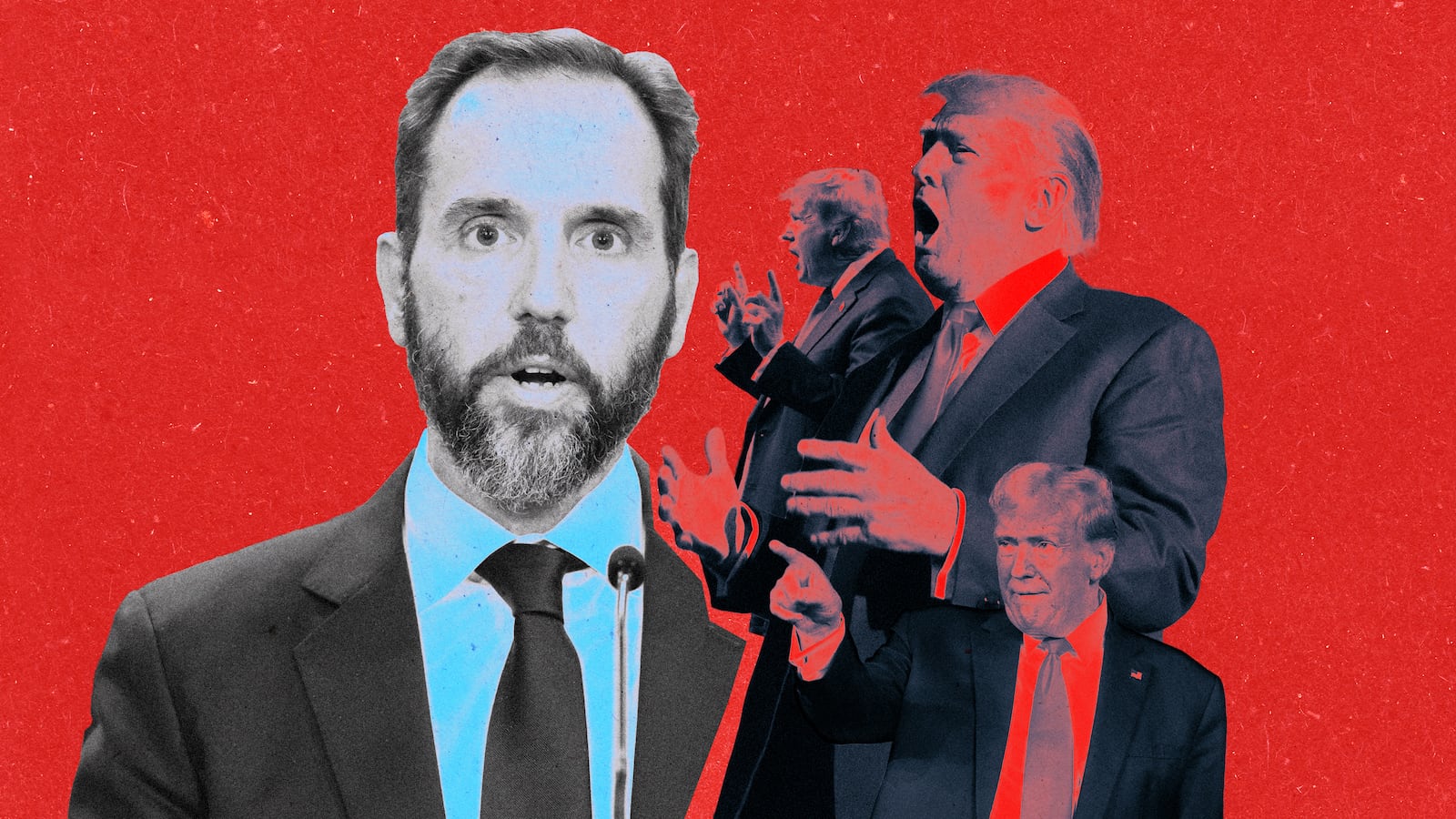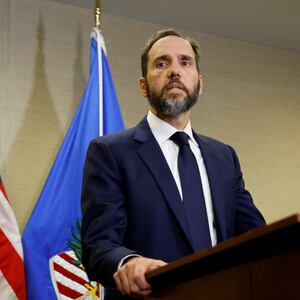As Special Counsel Jack Smith makes the case that former President Donald Trump shouldn’t have vast immunity to commit crimes, Smith has compiled a very curious list of theoretical misdeeds that seem to telegraph potential bombshells at his upcoming D.C. trial.
Accepting a bribe, ordering an FBI director to fake evidence against a political foe, ordering the military to murder critics, and even selling nuclear secrets to a foreign enemy—these are the particular and peculiar crimes that prosecutors say Trump could get away with if he succeeds in arguing that presidential immunity gives him king-like powers to do as he pleases from the White House.
Again, theoretically, of course.
“In each of these scenarios, the president could assert that he was simply executing the laws; or communicating with the Department of Justice; or discharging his powers as commander-in-chief; or engaging in foreign diplomacy,” prosecutors wrote to appellate judges on Saturday.

Former President and Republican presidential candidate Donald Trump speaks during a "Commit to Caucus" event for his supporters in Coralville, Iowa.
Vincent Alban/ReutersThey used nearly identical phrasing in a court filing to U.S. District Judge Tanya Chutkan in October.
The billionaire and the special prosecutor are currently battling ahead of a criminal trial in the nation’s capital, tentatively scheduled to begin in March on the eve of Super Tuesday. Trump is desperately trying to delay it, with his lawyers openly complaining that the trial could interrupt his presidential campaign at the height of the state primary elections. Meanwhile, Smith wants to start it as soon as possible, something that would allow GOP voters choosing their top Republican candidate to see federal prosecutors finally lay out their evidence that Trump broke the law by trying to overturn the 2020 election.
But D.C. appellate judges must first consider key issues, including whether Trump can effectively render himself immune from criminal prosecution by justifying everything he did as an official presidential act.
That’s what has Smith’s prosecutors warning that Trump’s delusions of invulnerability pose a danger to the fate of the republic.
“The implications of the defendant’s broad immunity theory are sobering. In his view, a court should treat a President’s criminal conduct as immune from prosecution as long as it takes the form of correspondence with a state official about a matter in which there is a federal interest, a meeting with a member of the executive branch, or a statement on a matter of public concern,” they wrote on Saturday.
Over the weekend, the usual legal commentators who weigh in on MAGA madness zeroed in on Smith’s bizarre examples of specific scandals.
“Interesting choice of hypotheticals…” tweeted the lawyer George Conway, whose ex-wife Kellyanne Conway long served as a Trump political adviser.
“It took quite an imagination,” he later added, sarcastically.
Smith’s prosecution team has been incredibly tight-lipped in the run-up to trial, forcing journalists to rely almost entirely on the steady stream of court documents in the case—but leaving the curious crowd of onlookers reading the tea leaves and trying to make sense of hints and innuendo. Some found it humorous when the D.C. indictment charging the 45th American president ran 45 pages. This time around, the peanut gallery swears Smith is telegraphing his case.
Former federal prosecutor Renato Mariotti, who co-hosts the It’s Complicated legal podcast, drew his followers’ attention to Smith’s warning that blanket immunity would spare any president “who instructs the FBI Director to plant incriminating evidence on a political enemy [or] a president who orders the National Guard to murder his most prominent critics.”
Trump’s attorneys have previously shrugged off any notion that these theoretical crimes are rooted in reality. The last time prosecutors floated these ideas, defense lawyers Todd Blanche and John F. Lauro ripped into Smith’s team for even venturing into that zone.
“Ignoring actual lessons from history, the government provides a list of lurid hypotheticals that have never happened—including treason and murder,” they wrote in a Oct. 26 court filing.
They also tried to make a legal distinction between Smith’s examples and whatever Trump actually did, doubling down on their theory that the billionaire was acting in his official capacity when he told Georgia’s top elections official to “find” 11,780 non-existent votes, attempted to employ fake electors, and tried to pressure his vice president to interrupt certification of the election results.
But in distinguishing between Smith’s examples and Trump’s actions, defense lawyers also cornered themselves—making clear that if Trump actually did any of Smith’s “lurid” hypotheticals, there’s no way his official position would save him.
“Some or all of these hypotheticals, depending on the facts, would likely involve purely private conduct, rendering them irrelevant here,” they wrote.
The fate of the trial is now in the hands of Judges J. Michelle Childs, Karen LeCraft Henderson, and Florence Y. Pan. The judges haven’t heard oral arguments yet, but they gave some indication on Tuesday that they plan to explore whether they might just kick the case right back to the trial judge—or force Smith off the case entirely.
In an extremely brief order on Tuesday, the judges advised that “counsel be prepared to address” what they called “discrete issues” raised in court filings by third parties. So far, that only includes an argument made by the government watchdog nonprofit American Oversight that Trump’s supposed immunity isn’t even an appellate issue before the trial takes place—and an argument by five former officials in Republican administrations that giving Trump the blanket immunity he desires would "unleash a future president" into becoming a dictator who could "deploy the military in efforts to alter the results of a presidential election."
Smith’s prosecutors and Trump’s defense team are scheduled to argue in court next Tuesday.







